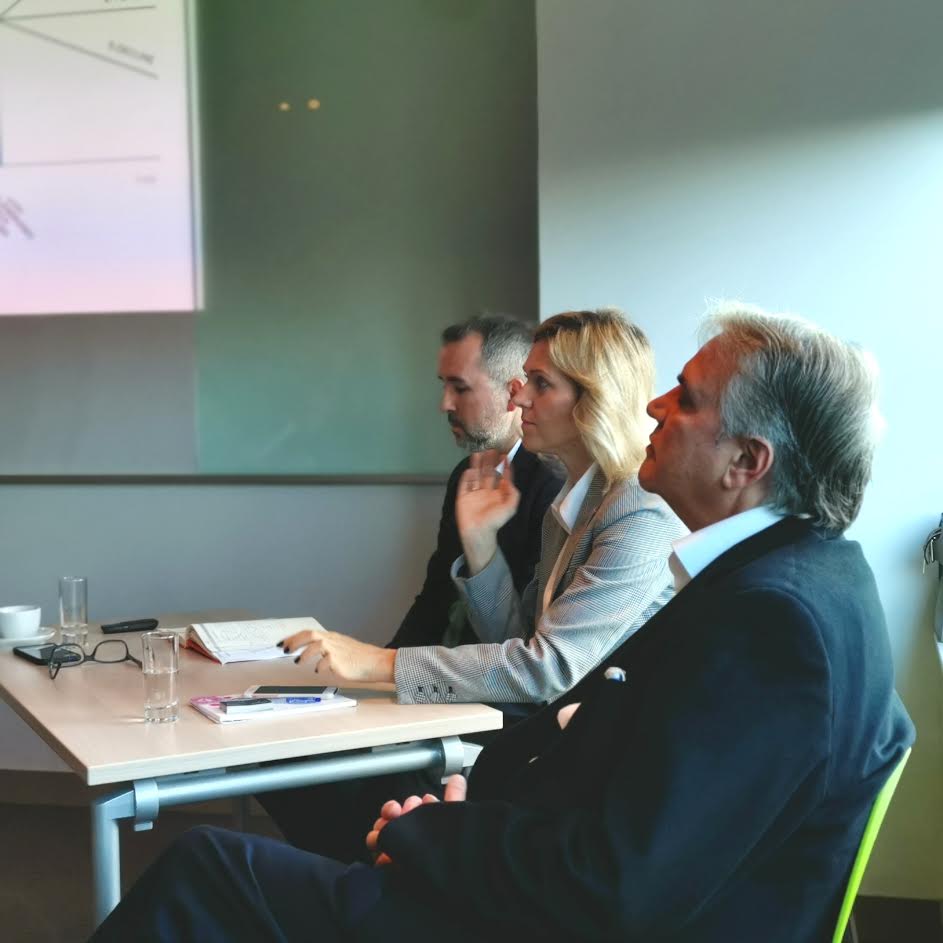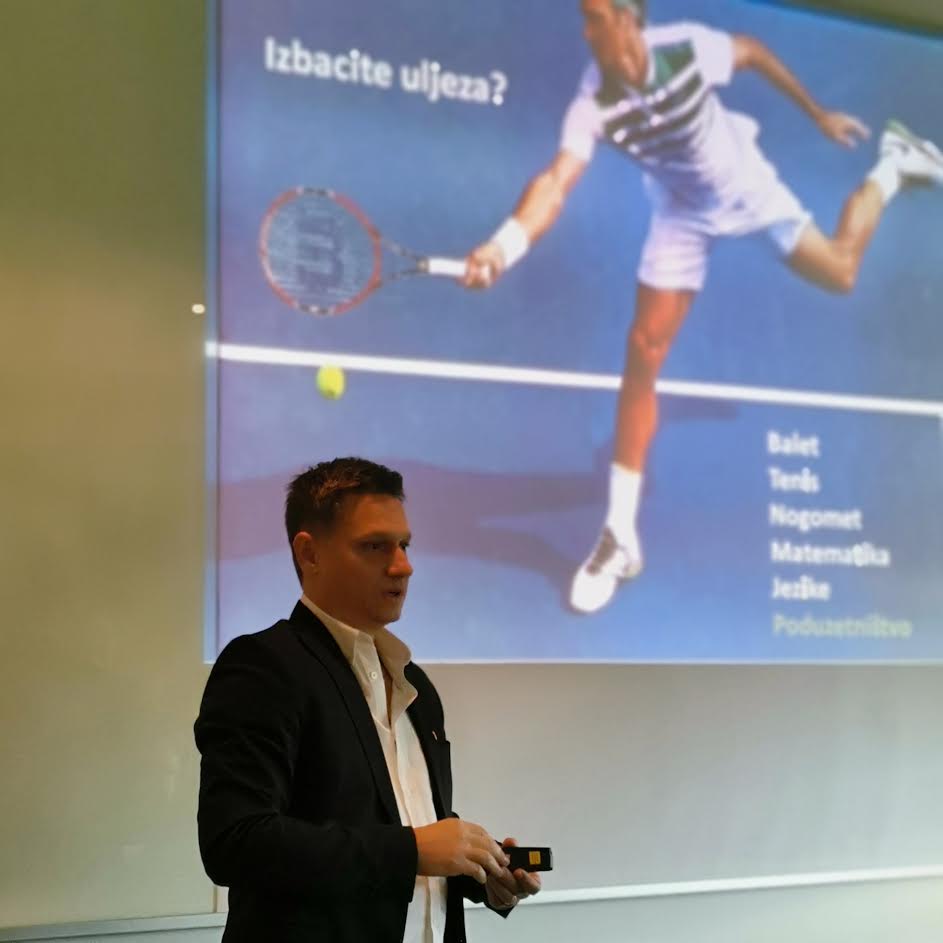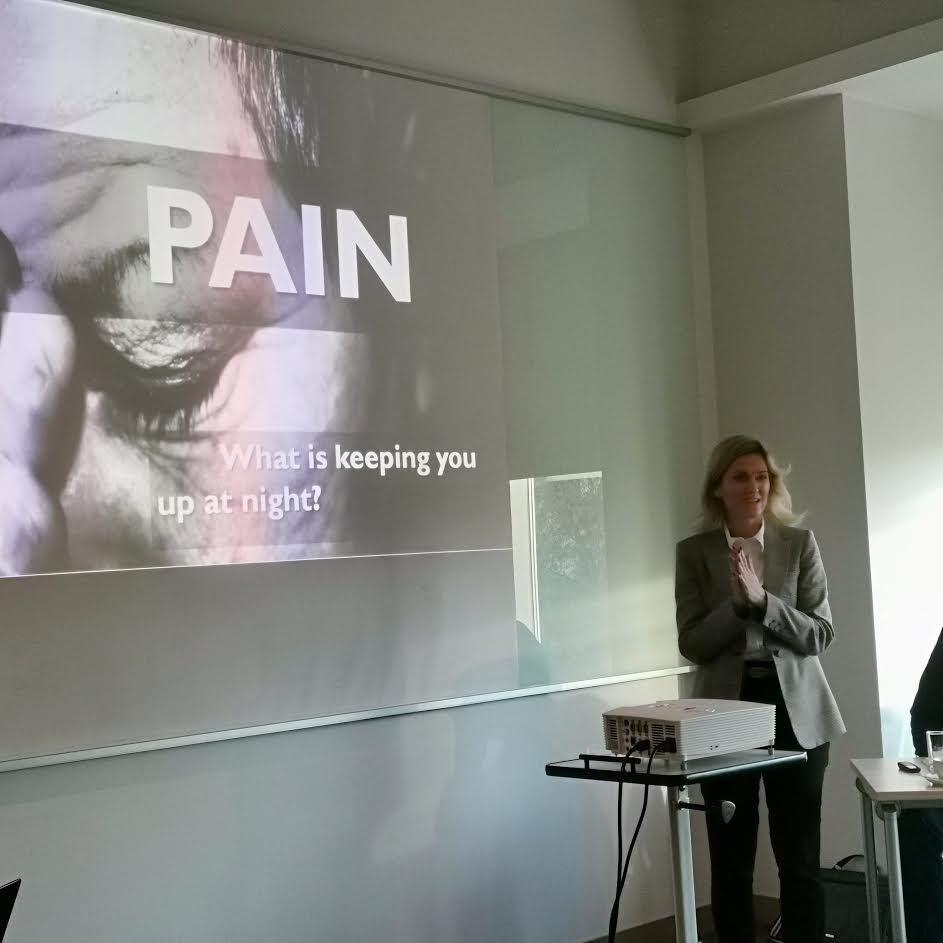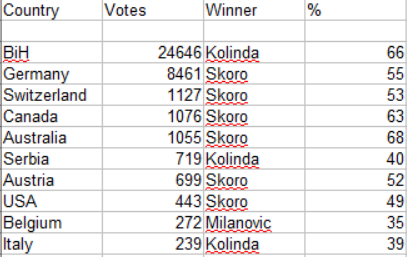Grabar-Kitarović Presents Croatian Charter to Associations in Germany
ZAGREB, February 11, 2020 - Croatian President Kolinda Grabar-Kitarović ended her visit to Germany on Monday by visiting Mainz, where she presented the Croatian Charter to local Croatian associations and met with Croatian and German business people, thanking expatriates for their support during her term in office.
"By awarding this charter, I wish to symbolically complete my presidential term, during which I paid special attention to Croatian expatriates, Croats from Croatia and Bosnia and Herzegovina who exchanged their home for life outside the homeland," she said.
The charter was awarded for patriotism, volunteer work on the cultivation of Croatian culture, language and customs, and for the promotion of Croatia and its cooperation with Germany.
Grabar-Kitarović said that since the beginning of her term she had insisted on the revival of relations with expatriates.
"Although there are still many obstacles on that road, thanks to the efforts of your communities and associations, in recent years we have witnessed returns as well as economic and social ties whereby we have bridged the gap between Croatians abroad and at home," she added.
More diaspora news can be found in the dedicated section.
Croatian World Games to Be Held in Zagreb from 21 to 25 July
ZAGREB, February 3, 2020 - The fifth Croatian World Games, which will be held in Zagreb from 21 to 25 July, will gather about 1,500 athletes and Croats who live, work and study on all continents, the office of the Croatian World Congress announced last Friday.
"The largest amateur sports competition, which brings together Croats from all over the world in a unique way, aims to connect young people through sports and cultural gatherings," said Croatian World Congress president Vinko Sabljo.
Every year, he added, the games show an increase in the number of sports events and in the number of competitors, and more than 1,500 participants are expected to take part this year.
The games bring together people who have Croatian roots, regardless of their nationality, religion, mother tongue or affiliation with a federation, organisation, association or club. The competitors, who represent the country they live in, are provided with free accommodation, food and equipment.
More diaspora news can be found in the dedicated section.
500 Scholarships to Be Awarded to Croatians Abroad
ZAGREB, December 29, 2019 - The Central State Office for Croats Abroad has announced it will award 500 scholarships to Croatian students living abroad for the current academic year, of which 100 for study programs in Croatia and 400 for programs in Bosnia and Herzegovina.
Scholarships are given for a period of 10 months, in monthly amounts of 700 kuna. The total budget is 3.5 million kuna.
Applications are invited until 22 January 2020, and eligible are Croatian students residing and studying in Bosnia and Herzegovina, Austria, Bulgaria, the Czech Republic, Hungary, Kosovo, Montenegro, North Macedonia, Romania, Serbia, Slovakia and Slovenia, as well as members of the Croatian diaspora enrolled in universities in Croatia.
More information is available on the website of the Central State Office for Croats Abroad at https://hrvatiizvanrh.gov.hr/.
More diaspora news can be found in the dedicated section.
How Election Voting Patterns Highlight Diversity of Croatian Diaspora
December 28, 2019 - The Croatian diaspora is diverse and complex - a look at voting patterns in Croatian elections and referenda.
There are an estimated 4 million Croatians living abroad, a diaspora numerically as large as those living in the homeland itself. They are located literally all over the world, with the latest official estimates a few years ago claiming the largest group (1.2 million) are in the USA, followed by Germany (350,000), Argentina, Australia (250,000) and Chile (200,000).
EU entry has increased the number of those living in Germany considerably, and new diaspora centres, such as Ireland, have emerged since 2013. This highlights one of the realities of the Croatian diaspora - far from being one cohesive group, their emigration has taken at different times, and for different reasons - sometimes economic and sometimes political - and Croatia today is experiencing its fourth significant wave of emigration.
As someone who had no concept of the subtle differences between sections of the diaspora, it was fascinating to talk to a Kiwi returnee, whose family emigrated for economic reasons in 1916, before the establishment of any Yugoslav state. His parents and grandparents considered themselves to be Dalmatian first and foremost, rather than Croatian. Just a little further north, by contrast, the majority of the Croatian diaspora emigrated from Tito's Yugoslavia, many for political rather than economic reasons. The difference is important, as it affects the relationship with the homeland. Parts of the Australian diaspora are among the most vocal and patriotic on social media.
A further complexity in the relationship between the diaspora and the homeland lies in the sense of disappointment at the lack of gratitude and blatant fraud that occurred with the billions that were sent from the diaspora to aid the war effort and to invest in the newly independent country. What could and should have been the start of a beautiful relationship ended up being one shrouded in recrimination and suspicion, and many in the diaspora felt trapped - in love with their country and wanting to play their part, but vehemently opposed to those who ran it.
And yet the money keeps coming. Around two billion euro a year is sent to Croatia each year from the diaspora in remittances etc, more than the entire amount of foreign investment, a huge sum without which the economy would struggle.
The diaspora has the vote, and yet does not pay tax, something which irks those living in the country. Historically, the diaspora has overwhelmingly voted for the right and HDZ, and the three MPs which represent them in the Parliament are usually from that party.
A complex situation, with many more layers than those outlined above.
This year's Presidential election had a rather interesting addition in that there was a credible challenge to the two strongest candidates, former SDP Prime Minister Zoran Milanovic and the official HDZ candidate, current President, Kolinda Grabar-Kitarovic. Kolinda, who ordinarily would have picked up most fo the diaspora votes (and those on the right) found a challenger from the right - populist singer Miroslav Skoro. Skoro came within 50,000 votes of beating her in the first round of the election, winning big in eastern Croatia, including symbolic Vukovar. I was curious to see how the diaspora voted with this additional dynamic.
And so began rather an interesting afternoon of research of official statistics, which took me far beyond who voted for who in 2019, and gave a little more colour to the diversity of the Croatian diaspora. Let's begin...
The first major surprise was the number of people from the diaspora who voted. While the majority of the estimated 4 million all over the world will not have Croatian citizenship and thus the entitlement to vote, even if they were sufficiently interested, I was expecting a much higher number of voters from the diaspora - just 40,782 cast their votes in the first round of the 2019 presidential election. And if you exclude neighbouring Bosnia and Hercegovina where Kolinda won big, the number of Croatian diaspora voters worldwide was just 16,136. Kolinda got just a third of those votes, as Skoro was the main victor, as you can see from the table above.
In only 5 countries outside Croatia did more than 1,000 people vote, and it was a big surprise to find more people in Switzerland voting than in Canada or those vocal social media types in Australia. The United States, with its estimated 1.2 million mustered just 443 votes.
There are, I am sure, many reasons for this. Not all Croatians abroad have passports of course, and Croatia certainly doesn't make it easy for those who want to get citizenship. Polling stations are thin on the ground (there were just 4 in Australia for the EU referendum, for example - I don't have details for this election), and for those who left for political reasons, I am sure there is a fear and suspicion with engaging with the Croatian State before the required lustration.
But 40,782 voters represent about 1% of Croatians outside the Homeland. Not quite the level of engagement I was expecting compared to the mountains of abuse that appear daily in my inbox from Sydney and beyond.
The official elections website had an archive section with details on previous elections and referenda. Curious, I decided to check out how the diaspora voted in two major referenda in Croatia's recent past, whether or not to join the European Union in 2012, and the 2013 referendum on changes to the constitution defining marriage, often referred to as a referendum on gay marriage.
The diversity of voting all over the Croatian diaspora world reflected its many faces.
Two-thirds of voters backed the motion to join the EU in the 2012 referendum (66.27%), but opinions were much more polarised in the diaspora. In Venezuela, some 94% were for, followed by BiH (87%), Ireland (86), UK (85), Holland, Austria and Germany (84). Interestingly, although showing majority support, that support was significantly lower in Australia (51%), Canada (56) and the USA (65). Diaspora in three countries voted against EU entry - Argentina, Syria and South Africa. Voter turnout was much lower, just 14,494.
And while the vote on the 2013 referendum on amending the constitution got a similar final result (65.87%), the vote was a lot more polarised in the diaspora, ranging from 96% in BiH to just 8% in Ireland. The question again:
Are you in favor of the constitution of the Republic of Croatia being amended with a provision stating that marriage is matrimony between a woman and a man?
Canada (92%), Argentina (91) and Switzerland (86) were among those who voted for the motion, but there were many countries where Croatians voted against - Belgium, Bulgaria, Czechia, Chile, Denmark, Finland, Greece, Ireland, Qatar, China, Hungary, Holland, Norway, Portugal, Romania, Russia, USA, Slovakia, Slovenia, Spain, Sweden, Turkey, Ukraine, and UK. Voter turnout was similar to the EU, a little under 14,000 overall.
And so life goes on, and the complex relationship between the Croatian diaspora continues. They have the vote but don't use the vote. I have heard both sides complain about the diaspora having the vote. People within Croatia resent being lectured at by the diaspora who do not pay taxes (although there is always a convenient omission of the huge sums of money being poured in from abroad), while some in the diaspora moan about their lack of representation with just 3 seats in Parliament representing 4 million people outside Croatia.
As with most things in this beautiful country, nothing is simple.
For more on the Croatian diaspora, check out the dedicated TCN section.
Žigmanov Accuses Local Government in Subotica of Discrimination Against Croat Minority
ZAGREB, December 23, 2019 - Councillors of the DSHV party representing the Croat community in Serbia on Monday walked out of a Subotica Council meeting in protest against obstruction of the formation of a Croat school centre in the northern city.
DSHV president Tomislav Žigmanov said after the DSHV representatives left the meeting that although a year ago this party had proposed amending the decision on Subotica's network of pre-school institutions and elementary schools as a precondition for the registration of the Croat school centre, this item had not yet been added to the council's agenda.
"This is a more than obvious act of discrimination when it comes to initiatives by the Croat community," said Žigmanov.
The DSHV criticised the local Serb Progressive Party (SNS) and the Alliance of Vojvodina Hungarians for discrimination against the ethnic Croats in the city.
The Croatian school centre is the largest project of the Croat community in the education field since the introduction of lessons in the Croatian language in 2002.
There has been no official explanation from the city authorities of the reasons for the delay.
Žigmanov said that the project had been discussed with Serbia's top officials and that it was also one of the recommendations made by the Serbia-Croatia intergovernmental committee on minorities.
More news about the status of Croats in Serbia can be found in the Diaspora section.
Venatus Jones, Returnees Sparking Change in Croatian Attitudes to Business
December 15, 2019 - Small steps to change the business mindset in Croatia are underway - a first business breakfast from returnee business consultants, Venatus Jones.
Last week I met with a group of returnees from Australia, Germany and Canada who have a very lofty goal.
Gathering impressive experience from working abroad in Western free-markets under the umbrella of Venatus Jones, a consulting agency, they vowed to become an agent of change that will totally shift Croatia’s mentality toward business.
"It’s part of the Western mind frame isn’t it, to aim high?” asked Associate Director Gerhard Saric from Munich in Germany. “That’s perhaps one of the quintessential things we bring – a positive mindset. We are all about big goals and big targets, but we focus on strategy and planning.”
Gerhard is an EU funding expert and helps companies access EU grants. He has worked in the US and across Southeastern Europe, Croatia included, implementing large country development programs.

Watching a presentation at their first Business Breakfasts, a series of morning sessions to inform micro, small and medium enterprises about key areas of doing business – like strategy, structure, systems and style of management - it seemed this group could go far.
Their model, a 40-week program, works the same way a tennis coach, piano teacher or mathematic tutor would for your children. Not to turn them into world champions, but to improve their skills, perform better.
The key appears to be price.

“In order to generate huge social impact we need to have very wide reach, and to get reach we need to be accessible,” said founder Eugene Brcic Jones, an Australian with media, marketing and sales stints with global giants like AP, Heineken, KPMG and Vodafone. “We are affordable and we over-deliver in value to our clients.”
“We like to joke that we are cheaper than a cleaner,” he added. “Our clients need help in many areas, they cannot afford a marketing or sales specialist, then an operations and leadership expert, someone to conduct research, lobby or procure external funding. We have to be everything for our clients and we have to be affordable to everyone.”
To be fair, for a company barely over a year old, Venatus Jones’ client list and result in sparking growth are astonishing, including Poliklinika Bagatin, Museum of Illusions, Ultra, Skintegra, Rudjer Boskovic, RoomOrders, Curry Bowl, Velpapir …
The approach seems original, using a sports analogy.

“It is interesting that we invest so much in our children to improve in sports, hobbies or education, yet we do not do the same for businesses, which are the backbone of every society, encompassing entire families and communities,” said Aleksandra Papac, a banking and finance expert from Sydney, Australia.
“I remember going to university and then later in life realising that most of my knowledge came from the challenges my dad faced in running his small business,” she said. “I remember how just talking and sharing information as a young economics student was very helpful to him.”
Sometimes just airing out problems, bringing them out in the open can help to formulate solutions and chart strategies for growth. Otherwise business owners just compartmentalise these problems and it causes undue stress and anxiety.”
Mark Mocnay, from Quebec in Canada, has worked extensively across the US, Canada and the Caribbean advising about performance and leadership. He has also worked in Europe, particularly in aviation and tourism.
“Business owners in Croatia have not really had genuine experience of Western free-markets, apart from maybe when on holidays, through cousins or Youtube,” Mark said. “Some are doing really well, but their strategy often focuses on a few strong corporate or government connections. They need to focus more on reducing their risk by expanding their customer base, or introducing democratic management principles, lean and agile operations and processes.”
“In all honesty, there are strong socialist habits that need to be broken,” Mark said bluntly.
You can learn more about the Venatus Jones consulting service on the official website.
For the latest news from the Croatian diaspora, follow the dedicated TCN section.
Croatian Government Allocates 90,000 Euro for Croatian House in Subotica
ZAGREB, December 14, 2019 - The Croatian government on Friday awarded 90,000 euro to the Croatian minority in Serbia for the construction of the Croatian House in the northern city of Subotica and for staffing purposes of the Croatian National Council (HNV).
An agreement to that effect was signed at HNV headquarters by the state secretary of the Central State Office for Croats Abroad, Zvonko Milas, and HNV president Jasna Vojnić. The agreement was signed on the occasion of the national holiday of the Croatian minority in Serbia.
Milas said that by supporting a strategic project of this kind the Croatian government showed that it cared that the Croats in Serbia preserved all aspects of their identity, primarily their language and culture.
Vojnić said that this was a great day for the HNV because it showed that Croatia indeed understood the needs of the Croats in Serbia.
"What we emphasised during our meeting with Prime Minister Andrej Plenković earlier this year is that our Croatian community has great plans, ideas and potential, but that it needs to be strengthened in staffing terms and institutionally developed," Vojnić said.
The allocated funding will be used to build a new building to house all three professional institutions of the Croatian minority under one roof - the Institute for Culture, the Hrvatska Riječ (Croatian Word) newspaper publishing house and the HNV. Two persons will be hired for development projects and one to lead the HNV regional office.
The Croatian minority in Serbia celebrates December 13 as one of its four national holidays, when the HNV held its first electoral convention in 2002. The HNV is the representative body of the ethnic Croats in Serbia, with responsibilities in the areas of education, culture, information and the official use of the Croatian language.
More news about Croats in Serbia can be found in the Diaspora section.
Austrian Croats Urged to Develop Unity and Stronger Bonds
ZAGREB, December 7, 2019 - The Croatian Home in Vienna on Friday held a conference in the Austrian capital city, bringing together members of the Croatian community in that country as well as representatives of the Croatian people from Croatia and Bosnia and Herzegovina.
The speakers at the event, which was held in Austria Center Vienna, called for building firmer bonds among members of the Croatian community and for unity.
They agreed that it was necessary to generate greater synergy between representatives of associations of Austrian Croats with the aim of better promotion and protection of their identity, language and cultural heritage as well as their better integration in the Austrian society.
The head of the Croatian Home in Vienna, Andrej Lučić, said that the unity of the ethnic Croats should enable them to be an active protagonists in the Austria society.
"We need that unity," Lučić said.
The deputy head of the state office for Croatians abroad Croatia, Dario Magdić, said that this office would provide support to such efforts.
Petar Tyran informed the event of challenges facing the Burgenland Croats.
An estimated 50,000 Burgenland Croats live in Austria, apart from Croats who have arrived in Vienna and other developed areas of Austria in the recent decades to find employment.
More diaspora news can be found in the dedicated section.
Croats Day Marked in Hungary
ZAGREB, November 17, 2019 - Croatian Foreign Minister Gordan Grlić Radman took part in the marking of the 19th Croats Day in Baja, Hungary on Saturday, underlining the connection of Croats and Hungarians in the past and the present.
It is a well-known fact that Croats and Hungarians are linked by a shared past and a European present, he said, according to a press release from the ministry.
Croats are a recognised national minority in Hungary.
The minister said the contribution of Hungarian Croats to the nurturing of Croatian customs and cultural heritage was visible at many levels, and that Croatia would continue to support them. He thanked everyone who has cultivated the Croatian language, tradition, culture and customs in Hungary for centuries.
He said the government was investing a lot of effort to unite Croats at home and abroad.
"All that has been achieved so far and the special ties with Croats outside the homeland oblige us to continue to encourage development, to adapt and carry out the necessary reforms, to acquire new knowledge, standards and values so that we can ensure further progress and enable future generations on both sides of the border to live better lives," the press release quoted him as saying.
More diaspora news can be found in the dedicated section.
Diaspora Remittances Important Part of Balance of Payments
ZAGREB, November 12, 2019 - Remittances by Croatian citizens living abroad are close in amount to net tourism revenues and represent a very stable source of financing, but Croatia must generate an innovative economy to motivate them to generate those earnings in Croatia, economist Mladen Vedriš said on Tuesday.
He was speaking at the "Returnees and economic development" conference.
Over 2 billion euro in informal remittances, gifts, aid and pensions go into Croatia's balance of payments, according to the central bank, and the trend is rising, but the question is how much the people who have formed families abroad will feel the need to continue to send remittances, Vedriš said.
In tourism, only beds are a domestic resource and 70% of what we sell is imported, he said, adding that investments to motivate workers to return to Croatia could and must be found.
According to the findings of Zagreb Faculty of Humanities and Social Sciences surveys, 65% of those who left Croatia cited a poor financial situation as the main reason. Others are dissatisfaction with the situation in the country, widespread corruption, intolerance, poor work of state institutions and poor living conditions.
Return is possible only if decent living is made possible because only one in five emigrants refuse the possibility to come back, Vedriš said.
He cited German surveys showing that the education of one person through university graduation costs the state 260,000 euro on average, which is just one aspect of the brain drain. One engineer generates during his working life about a million dollars in new value which stays in Germany, and half of those who have left Croatia have university degrees.
Vedriš also cited Greek surveys showing that those who left the country took 12 billion euro in value with them and estimated the same applies to Croats working abroad.
The director of Germany's Konrad Adenauer Foundation for Croatia and Slovenia, Holger Haibach, said the conference was the result of an agreement with Croatia's Ivo Pilar Institute to jointly consider relations between governments, education, migration and similar issues given that 400,000 Croats live in Germany.
Haibach said the conference was a continuation of yesterday's panel "Remigration and circular migration as a cohesion strategy" as well as part of a series of events called "Talking Europe II 2019-2020", which are aimed at encouraging public debates on the EU's current challenges and future prospects ahead of Croatia's presidency of the Council of the EU in the first half of 2020.
More diaspora news can be found in the dedicated section.



